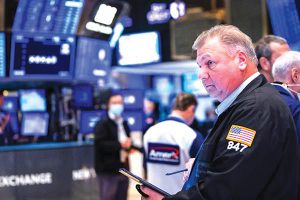Bloomberg
Stocks tumbled around the globe as recession fears resurfaced, with the Federal Reserve struggling to get on top of inflation that has proved more persistent and widespread than officials anticipated.
The S&P 500 closed at its lowest since December 2020, while the tech-heavy Nasdaq 100 sinks 4%. The deal spread on Elon Musk’s proposed takeover of Twitter Inc. widened as the billionaire wasn’t directly asked and didn’t address the issue on whether he’s committed to buying the social-media firm during a staff meeting. Homebuilders slid as mortgage rates jumped the most since 1987. In late trading, Adobe Inc. slumped after cutting its sales forecast.
The dollar falls as central banks in Europe stepped up monetary tightening, promising to narrow the gap between rates there and in the US. Treasuries rebounded from an earlier selloff.
Declaring that it’s essential to tame inflation, Jerome Powell engineered the biggest rate increase since 1994 and held out the distinct possibility of another jumbo hike in July.
While the Federal Reserve chief sought to soften the blow of the 75-basis-point boost, saying he didn’t expect such moves to be the norm, he tacitly admitted the chance of an economic downturn.
“We’re worrying about growth and where the Fed takes us ultimately,†said Chris Gaffney, president of world markets at TIAA Bank. “Yesterday, everybody said, ‘Oh good, the Fed is doing something aggressive, they’re going to get aggressive, they’ll try to catch up to the inflation curve.’ But now, you’re looking at it and saying, ‘Yeah, but are they chasing something they’re not going to be able to catch?’â€
While inflation is “out of control,†the Fed is doing the best it can give its limited tools, Orlando Bravo, co-founder of private-equity firm Thoma Bravo said. Despite the stock carnage, valuations still have much further to fall, according to Jim Chanos, founder of Chanos & Company LP.
The S&P 500 now implies an 85% chance of a US recession amid fears of a policy error by the Fed, according to JPMorgan Chase & Co. The warning from quant and derivatives strategists is based on the average 26% decline for the gauge during the past 11 recessions and follows its collapse into a bear market.
One technical indicator of US stocks shows the extent of the recent slump, while offering a whiff of optimism that it will soon come to an end.
The percentage of S&P 500 members that are trading above their 50-day moving average sinks below 5% this week, the lowest level since Covid-19 fears battered shares more than two years ago. Both that selloff and the one that hit markets in late 2018 reversed course shortly after seeing a similar share of stocks dip below the closely watched technical average.
Elsewhere, investors dumped European bonds and the franc rallied after a surprise Swiss rate hike. The pound rises as the Bank of England raised rates and signalled it’s prepared to unleash larger moves if needed. Currency options traders are betting the Bank of Japan will deliver a
policy surprise this week.
Commodities may deliver breath-taking returns amid tight supplies and low inventories, according to JPMorgan Chase & Co. Returns could total 10% by the end of the northern hemisphere summer and 5% by year-end. Volatility will also stay elevated, the report said. Oil may touch $150 per barrel in the short-term, while corn could reach $13 a bushel — a record price by a long shot.
 The Gulf Time Newspaper One of the finest business newspapers in the UAE brought to you by our professional writers and editors.
The Gulf Time Newspaper One of the finest business newspapers in the UAE brought to you by our professional writers and editors.
